Philadelphia Business Community
The Philadelphia Business Community is a dynamic and diverse organization representing a wide range of businesses within the city. Established in response to ongoing economic developments and tax reforms, the organization aims to support local enterprises through advocacy, networking, and economic development initiatives. With a history rooted in navigating the changing fiscal landscape of Philadelphia, including efforts surrounding the elimination of the Business Income and Receipts Tax (BIRT), the community has played a pivotal role in informing policy discussions. Since its inception, the organization has been committed to fostering a favorable environment for business growth, job creation, and sustainable economic progress in Philadelphia.
News Summary
The Philadelphia Tax Reform Commission has proposed a plan to gradually eliminate the Business Income and Receipts Tax (BIRT) over the next 8 to 12 years. This initiative aims to provide tax relief that could stimulate job growth and improve the local economy, affecting approximately 35,500 businesses. Critics express concerns about potential revenue losses impacting public services, adding complexity as city leaders prepare for the budget cycle. The commission advocates for starting with a reduction in the net profits tax to ease the financial burden on local businesses.
Philadelphia Tax Reform Commission Proposes Elimination of Business Income and Receipts Tax Over Next Decade
Philadelphia’s Tax Reform Commission has suggested a plan to eliminate the city’s Business Income and Receipts Tax (BIRT) over the next 8 to 12 years, a move that could significantly impact local businesses and city finances. The report, released on February 25, 2025, by a commission appointed by multiple city leaders, aims to provide tax relief that could stimulate job growth and enhance the overall economic landscape of Philadelphia.
BIRT, which consists of two components—a gross receipts tax and a net income tax—affects businesses earning $100,000 or more from transactions within city limits. In recent years, approximately 35,500 firms filed and paid BIRT annually, with a median tax bill of $1,315 for the years 2017 to 2021. The tax currently generates about $617 million, making it the third-largest source of tax revenue for Philadelphia, trailing only the wage tax at $2.6 billion and property tax at $930 million.
Key Findings and Recommendations
The Philadelphia Tax Reform Commission’s report advocates for the gradual elimination of BIRT, starting with the reduction of the net profits tax, currently set at 5.81%. The commission’s proposed schedules for rate cuts would unfold over five years, potentially decreasing the financial burden on businesses and contributing to job growth. The most ambitious proposal suggests a complete removal of the net profits portion within five years, with an estimated loss of nearly $1.4 billion in city revenue during the transition.
In addition to BIRT, the commission’s recommendations include future considerations for the gross receipts tax and even the wage tax, which is currently one of the primary revenue sources for the city. Philadelphia’s unique tax structure may see changes as officials debate the best course of action.
Critics’ Concerns
Current Tax Structure and Historical Context
The BIRT was implemented in 1985, allowing city leaders to tax both gross receipts and net income after obtaining state approval. This dual-structure tax system has long received criticism for being burdensome on businesses. Efforts have been made to reduce the net income tax portion in the past, decreasing from 6.5% in 2007 to its current rate. However, the gross receipts component has remained unchanged since 2008.
The city acknowledges that negotiations and agreement among City Council members and the Mayor will be crucial to realizing the commission’s recommendations. Furthermore, a lawsuit regarding BIRT exemptions for businesses earning less than $100,000 poses another layer of complexity that could affect the tax’s future.
Future Budget Implications
The Parker administration is preparing to potentially phase out the BIRT exemption. This decision follows an assertion that maintaining the exemption could lead to constitutional issues. Meanwhile, they are advocating for changes at the state level to create similar exemptions while also planning financial support for small businesses impacted by these changes.
For the 2026 fiscal year, the current budget includes approximately $17 million in reductions tied to BIRT and the wage tax, aligning with the overall strategy to reduce these taxes by 2039. As discussions continue, the implications of the Tax Reform Commission’s findings will play a central role in shaping Philadelphia’s economic future and the welfare of its businesses.
Deeper Dive: News & Info About This Topic
HERE Resources
Philadelphia Considers Major Tax Reform to Boost Economy
Philadelphia Tax Reform Commission Proposes BIRT Elimination
Philadelphia Tax Reform Commission Recommends Phasing Out BIRT
Governor Shapiro Awards $5 Million Grant to Al-Aqsa Islamic School
Concerns Raised Over Philadelphia’s $800 Million Housing Initiative
SEPTA Faces $213 Million Deficit, Service Cuts Proposed
Bipartisan Support Grows for School Choice in Pennsylvania
Philadelphia Commission Proposes Abolishing Business Income Tax
Philadelphia’s Small Businesses Affected by Tax Break Elimination
Philadelphia’s Budget Proposal Addresses Tax Reforms and Transit
Additional Resources
- Philadelphia Tax Reform Commission Recommendations
- Inquirer: Business Income and Receipts Tax Update
- Axios: Business Wage Tax Cuts in Philadelphia
- Inquirer: Mayor Parker on Small Business Tax Breaks
- Wikipedia: Tax Reform

Author: STAFF HERE PHILADELPHIA WRITER
The PHILADELPHIA STAFF WRITER represents the experienced team at HEREPhiladelphia.com, your go-to source for actionable local news and information in Philadelphia, Philadelphia County, and beyond. Specializing in "news you can use," we cover essential topics like product reviews for personal and business needs, local business directories, politics, real estate trends, neighborhood insights, and state news affecting the area—with deep expertise drawn from years of dedicated reporting and strong community input, including local press releases and business updates. We deliver top reporting on high-value events such as Mummers Parade, Philadelphia Flower Show, and Thanksgiving Day Parade. Our coverage extends to key organizations like the Greater Philadelphia Chamber of Commerce and United Way of Greater Philadelphia, plus leading businesses in telecommunications, food services, and healthcare that power the local economy such as Comcast, Aramark, and Children's Hospital of Philadelphia. As part of the broader HERE network, we provide comprehensive, credible insights into Pennsylvania's dynamic landscape.





